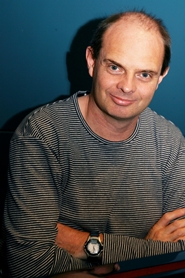My work in music: Bruce Crossman

Bruce Crossman, Senior Lecturer, Composition from the School of Humanities and Communication Arts, recently featured on the ABC Classic FM's 'New Music Up Late' program. The program included his latest Chinese opera-influenced vocal chamber work, Gentleness-Suddenness , as well as some Korean kayageum and Cantonese Opera. Here, Bruce provides an insight into his world of music and what influences him.
If you'd like to hear some of Bruce Crossman's work, Gentleness-Suddenness, watch and listen to his Vimeo clip (opens in a new window).
Creating a personal voice in music composition comes from the culture of place, which in my case is the character and sounds of the Asia-Pacific region. In my compositional practice, mind and spirit give birth to "living colours" of sound influenced by ideas from the Asia-Pacific.
My visit to Tokyo and Hong Kong in 2010 inspired me creatively. In Japan, at the Asian Music Festival in Tokyo, not only did the vigorousness of the calligraphy stimulate my creativity, so too did a traditional Japanese musical performance on the shakuhachi (traditional flute) – with its vibrant colour chunks engaging, it was as if every sound was a lively, wriggling colour given a moment to frenetically climax.
In Hong Kong, the collision of cultures and vibrancy was inspiring. At the Ko Shan Theatre, the Cantonese Opera's emphasis on energised percussion sounds leaping into the air as raw excitement took away any timidity I had about using sound.
When composing the music-theatre work Gentleness-Suddenness, I aimed to create a meditation on the nature of love and creativity, highlighting its passion and intimacy. The text for the work is an amalgamation of portions of the Chinese playwright Tang Xianzu's Kunqu classic The Peony Pavilion: Mudan ting and similar Judaic-Christian biblical sources from Genesis, Song of Songs, Psalms and Revelation.
The East-Asian influence can be heard in my music in Gentleness-Suddenness – it cuts loose with raucous juxtapositions, predominantly driven by metal gongs and wriggling lines amid extensive pushing of vocals, the violin and piano sonorities. The work also contains the implied heavenly intimacy of Zhe yi sha tian (This brief moment) and spiritual life of The angel showed me the river. This intimate creative union is caught by metal vibrations from the Japanese temple bowl and Filipinokulintang, which suddenly break the "silence" of the surrounding nuanced "living colours" of soft vibraphone gong-chimes and wriggling Chinese opera-influenced vocal-vibrato lines. In a sense, this conceptualisation of the musical process grew out of Asian Music Festival administrator Miyoshi Izumi's idea of "gentleness as something that is broken".
Mobile options:

